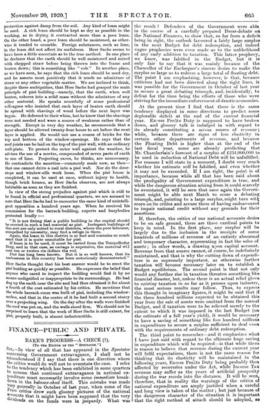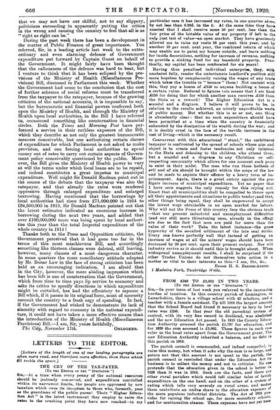FINANCE—PUBLIC AND PRIVATE.
RAKE'S PROGRESS—A CHECK (?).
[To TRH EDITOR OF THE " SPECT/T011."1 view of all that has appeared in the Spectator concerning Government extravagance, I shall not be Misunderstood if I say that there is one direction where the critics would do well not to overstate the case. I refer to the tendency which has been exhibited in some quarters to assume that continued extravagance in national ex- Penditure must necessarily involve some immediate break- down in the balance-sheet itself. This mistake was made Iery generally in October of last year, when some of the noss critics drew such gloomy pictures of the national alcounts that it might have been supposed that the very tliNidends on the funds were in jeopardy. What was the result ? Defenders of the Government were able in the course of a carefully prepared Dress-debate on the National Finances, to show that, so far from a deficit being in sight, the outlook favoured a fairly large surplus in the next Budget for debt redemption, and indeed vague prophecies were even made as to the unlikelihood of any early addition to taxation. This latter prophecy, we know, was falsified in the Budget, but it is only fair to say that it was mainly because of the Chancellor of the Exchequer's sincere desire to make the surplus so large as to redeem a large total of floating debt. The point I am emphasizing, however, is that, because criticism had not been directed along the right lines, it was possible for the Government in October of last year to secure a great debating triumph, and, incidentally, to defeat for the time being the efforts of those who were striving for the immediate enforcement of drastic economies.
At the present time I find that there is the same tendency displayed in some directions to predict some deplorable deficit at the end of the current financial year. Excess Fri:dig Duty is supposed to have broken down, and gloomy talk is indulged in with regard to its already constituting a minus source of revenue; while, because there are signs of less elasticity in certain other departments of revenue, and because the Floating Debt is higher than at the end of the last fiscal year, some are already predicting that Mr. Chamberlain's forecast of a surplus of £231,000,000 to be used in reduction of National Debt will be unfulfilled. For reasons I will state in a moment, I doubt very much whether his estimate will be falsified, and even whether it may not be exceeded. If I am right, the point is of importance, because while all that has been said about the prodigality of Government expenditure is true, and while the dangerous situation arising from it could scarcely be overstated, it will be seen that once again the Govern- ment might be able next March to score a debating triumph, and, pointing to a large surplus, might turn witt scorn on its critics and accuse them of having endeavoured to impair national credit without any grounds for their assertions.
If, therefore, the critics of our national accounts desire to be on safe ground, there are three cardinal points to keep in mind. In the first place, any surplus will be largely due to the inclusion in the receipts of some hundreds of millions of revenue of an entirely abnormal and temporary character, representing in fact the sales of assets ; in other words, a drawing upon capital account,. Revenue from that source cannot, of course, be indefinitely maintained, and that is why the cutting down of expendi- ture is so supremely important, as otherwise further taxation will become necessary later on to establish a Budget equilibrium. The second point is that not only would any further rise in taxation threaten something like financial disaster, but, unless there is an actual relief given to existing taxation in so far as it presses upon industry, the most serious results may follow. Thus, to express this thought in imaginary figures, it might be said that if the three hundred millions expected to be obtained this year from the sale of assets were omitted from the normal Budget, and if taxation were to be relieved merely to the extent to which it was imposed in the last Budget (on the estimate of a full year's yield), it would be necessary to have a saving of something like five hundred millions in expenditure to secure a surplus sufficient to deal even with the requirements of ordinary debt redemption.
The third point to remember—and it emphasizes what I have just said with regard to the ultimate huge saving in expenditure which will be required—is that while there is reason to believe that revenue during the current year will fulfil expectations, there is not the same reason for thinking that its elasticity will be maintained in the following years, Excess Profits Duty being probably then affected by recoveries under the Act, while Income Tax revenue may suffer as the years of artificialprosperity during the war recede into the distance. It will beacon, therefore, that in reality the warnings of the critics of national expenditure are amply justified when a careful and long view is taken of the mattes-; but just because of the dangerous character of the situation it is important that the right method of attack should be adopted, so
that we may not have our skilful, not to say slippery, politicians succeeding in apparently putting the critics in the wrong and causing the country to feel that all is as "right as right can be."
During the past week there has been a development in the matter of Public Finance of great importance. You referred, Sir, in a leading article last week to the extra- ordinary and even alarming defence of Government expenditure put forward by Captain Guest on behalf of the Government. It might fairly have been thought that the callominess of the defence was hard to beat, but I venture to think that it has been eclipsed by the pro- visions of the Ministry of Health (Miscellaneous Pro- visions) Bill, discussed in Parliament this week. Whether the Government had oome to the conclusion that the cost of further schemes of social reforms must be transferred from the taxpayer to the ratepayer, because of the growing criticism of the national accounts, it is impossible to say, but the bureaucratic and financial powers conferred both upon the Ministry of Health, and through the Ministry of Health upon local authorities, in the Bill I have referred to, occasioned something like consternation in financial circles. Both the Tinies and Morning Post have per- formed a service in their ruthless exposure of the Bill, which they describe as not only the greatest bureaucratic measure conceivable, but one authorizing certain classes of expenditure for which Parliament is not asked to make provision, and one forcing local authorities to spend money out of rates to carry out certain aspects of Govern- ment policy conceivably questioned by the public. More- over, the Bill gives the Ministry of Health power to vary at will the terms under which local loans are to be repaid, and indeed constitutes a great impetus to municipal expenditure. Well might Sir Donald Maclean point out in the course of the debate that the taxpayer was also the ratepayer, and that already the rates were rendered oppressive through enlarged expenditure and enlarged borrowing. Having mentioned that the borrowings by local authorities had risen from £71,000,000 in 1914 to E84,500,000 in 1919, Sir Donald Maclean pointed out that the latest estimates indicated an enormous increase in borrowing during the next two years, and added that over £100,000,000 more was being spent by local authori- ties this year than the total Imperial expenditure of the whole country in 19141 Thanks both to the Press and Opposition criticism, the Government perceived that it had gone too far in the terms of this most mischievous Bill, and accordingly something like thirteen clauses were deleted, still leaving, however, many clauses of a most dangerous character. In some quarters the more conciliatory attitude adopted by Mr. Boner Law in the face of strong criticism has been held as an encouraging indication. I am afraid that in the City, however, the more abiding impression which has been left is one of consternation that the Government, whioh from time to time pays lip service to economy and asks its critics to specify directions in which expenditure might be curtailed, has had the effrontery to espouse a Bill whioh, if it passes in its original form, must of necessity commit the country to a fresh orgy of spending. In fact, if the Government had wished to demonstrate its lack of sincerity with regard to economy in the national expendi- ture, it could not have taken a more effective means than the introduction of the Ministry of Health (Miscellaneous Provisions) Bill.—I am, Sir, yours faithfully,



































 Previous page
Previous page